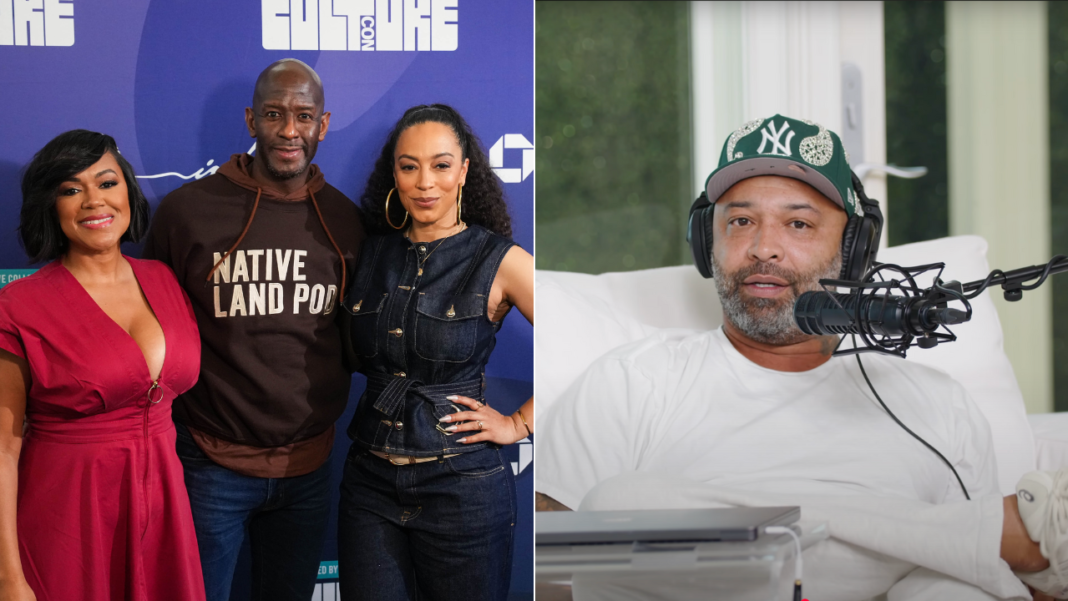In the realm of social media discourse, few conversations spark as much fervor as the exchange between intellectual heavyweights and personalities rooted in grassroots culture. Recently, a potent exchange featuring Marc Lamont Hill and QueenzFlip on the Joe Budden Podcast has ignited a wildfire of debate, particularly across Black social media. This dialogue has resonated deeply, prompting responses from prominent figures like Angela Rye, Tiffany Cross, Andrew Gillum, and Bakari Sellers on their Native Land Podcast episode titled “Joe Budden’s Podcast and the Dumbing Down of America.”
Angela Rye, one of the episode’s hosts, expressed a willingness to engage with Marc, valuing the opportunity to have tough discussions. She emphasized, “Of course, Marc is welcome anytime. I don’t know about the rest of them.” Rye’s comments underline a distinction between intellectual discourse and social media banter, advocating for an environment where varying perspectives can coexist, even when conflicts arise.
Continuing in that vein, Rye lamented the growing trend of some individuals refusing to engage with differing viewpoints. “I just want better for him,” she remarked, underscoring the importance of constructive dialogue. This perspective reflects a broader concern about barriers to intellectual growth, particularly within Black communities, where the conversation often dips into anti-intellectualism.
Andrew Gillum, another Native Land host, added another layer to the discussion by highlighting the potential for exposure to diverse ideas through platforms like the Joe Budden Podcast. He said, “At least somebody gets an exposure to his perspective that may not have otherwise had it.” Here, he captures the essence of why such exchanges, no matter how contentious, are critical—they open doors for understanding various attitudes and backgrounds.
However, the Native Land Podcast’s framing of these conversations drew ire from Joe Budden and his co-hosts. Budden critiqued Rye and her team for their immediate categorization of QueenFlip’s commentary as less credible, which he found hypocritical given the podcast’s pro-Black stance. His assertion that such judgments perpetuate a cycle of exclusion within the Black community highlights an ongoing struggle against the dismissal of voices often considered ‘less than’ within intellectual spheres.
Ish, another co-host, echoed this sentiment by criticizing how intellectual spaces often privilege certain demographics while disregarding others. This highlighted a troubling trend—the tendency to categorize intellect by social standing or background rather than the substance of arguments presented. His comments reflect a challenge to the narrative that divides, rather than unites, within the community.
Moreover, Parks Vallely pointed out the importance of engaging with entire discussions rather than snippets, saying, “You can’t just spitball some shit and then claim you’re an intellectual.” This call for accountability resonates strongly within the community, as it underscores the necessity of informed dialogue rather than reactionary commentary based solely on soundbites.
As the discourse evolved, even QueenzFlip weighed in on the critiques, questioning Rye on whether her stance indicated an assumption of irredeemability regarding his perspectives. This back-and-forth sheds light on a crucial aspect of these discussions—recognizing and respecting the individual journeys toward understanding and dialogue, no matter where one begins.
Budden defended this approach, emphasizing the value of authenticity in personal growth. “I allow people to see my shortcomings,” he shared, positioning himself as not just a voice of authority but also a participant in the journey of learning. This humility positions him against the backdrop of an often rigid intellectual environment, advocating for compassion and understanding.
The clash of narratives between Budden’s team and the Native Land hosts captures the delicate balance within the cultural conversation—a struggle between maintaining intellectual rigor and remaining open to diverse perspectives. As different sides continue to voice their opinions, it gives rise to another layer of discourse about representation, credibility, and the responsibility for creating inclusive spaces that uplift varied viewpoints.
This situation, much like the original viral moment between Hill and QueenzFlip, has served as a catalyst for broader discussions about these dynamics. While some see it as an opportunity to engage in intellectual critique, others suggest it merely highlights underlying tensions within the community regarding who gets to define ‘intellectual’ discourse. Each perspective adds depth to the conversation, illustrating the complexity of navigating identity and understanding within cultural discussions.



